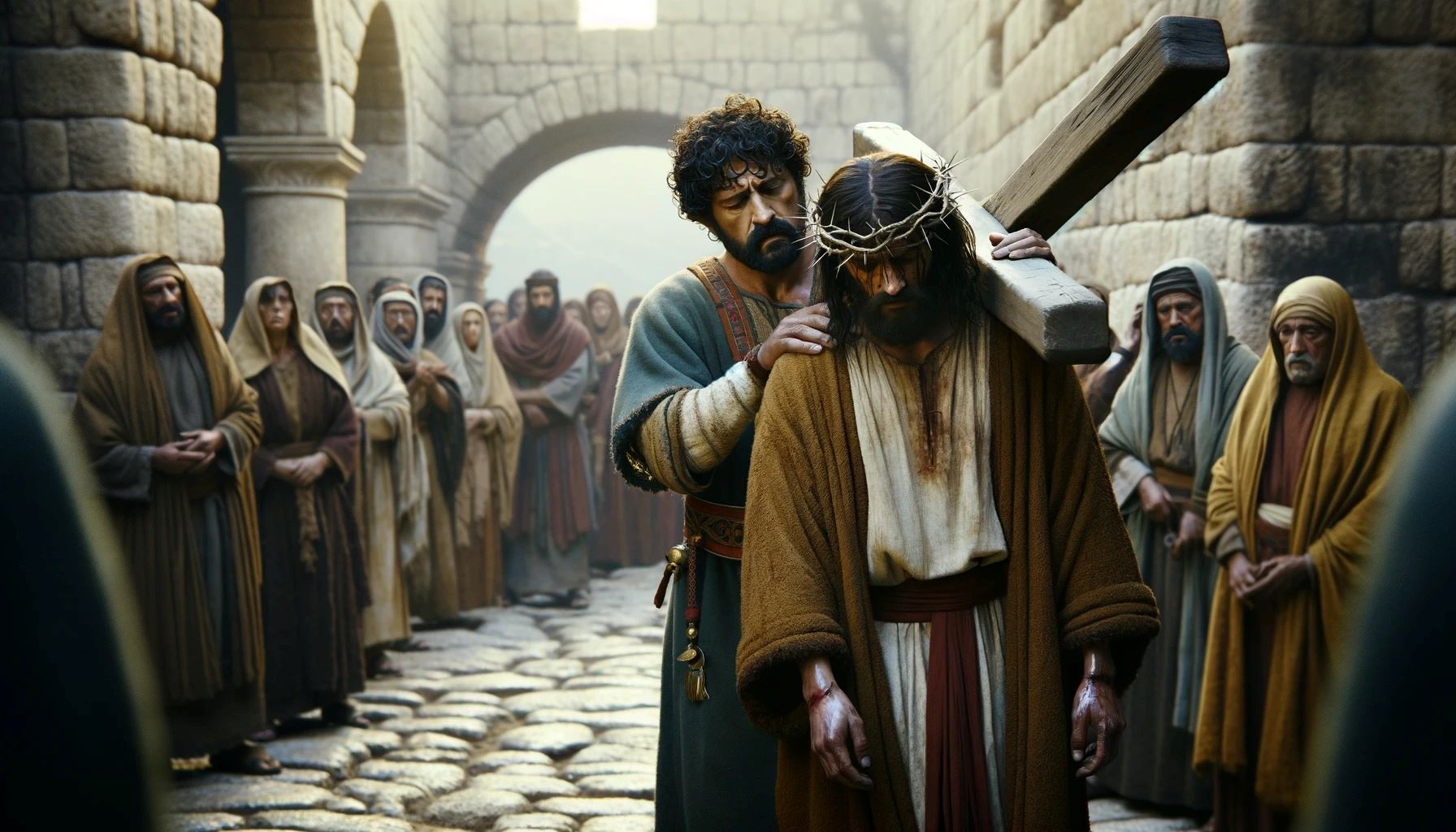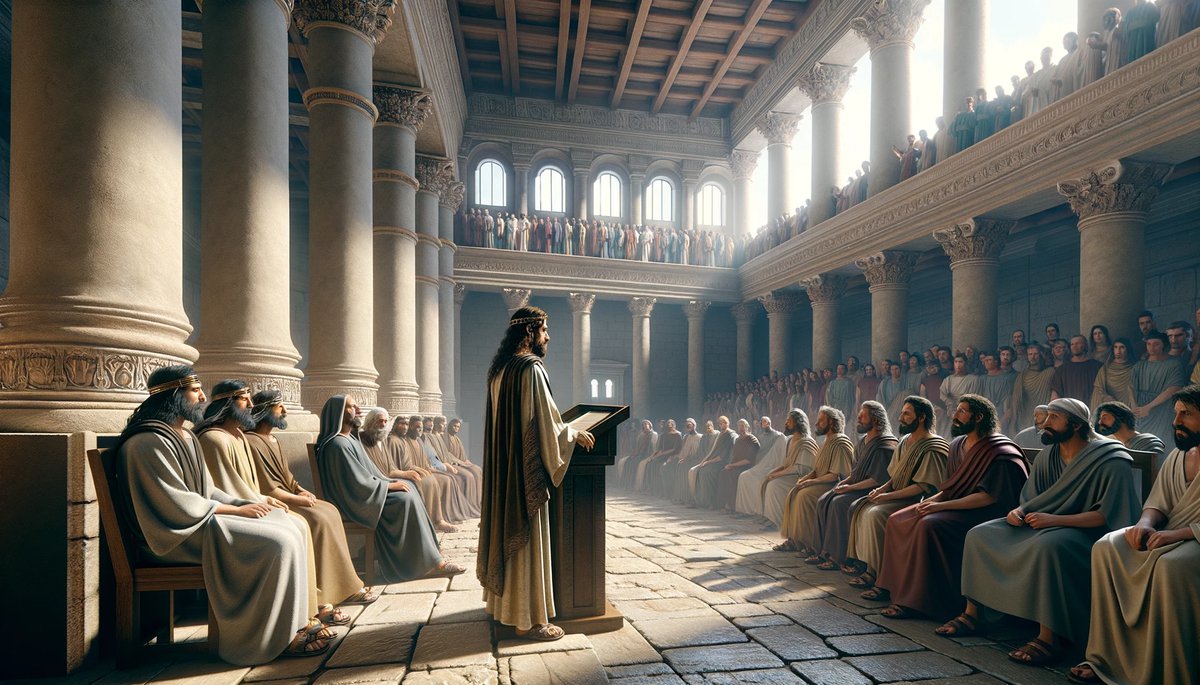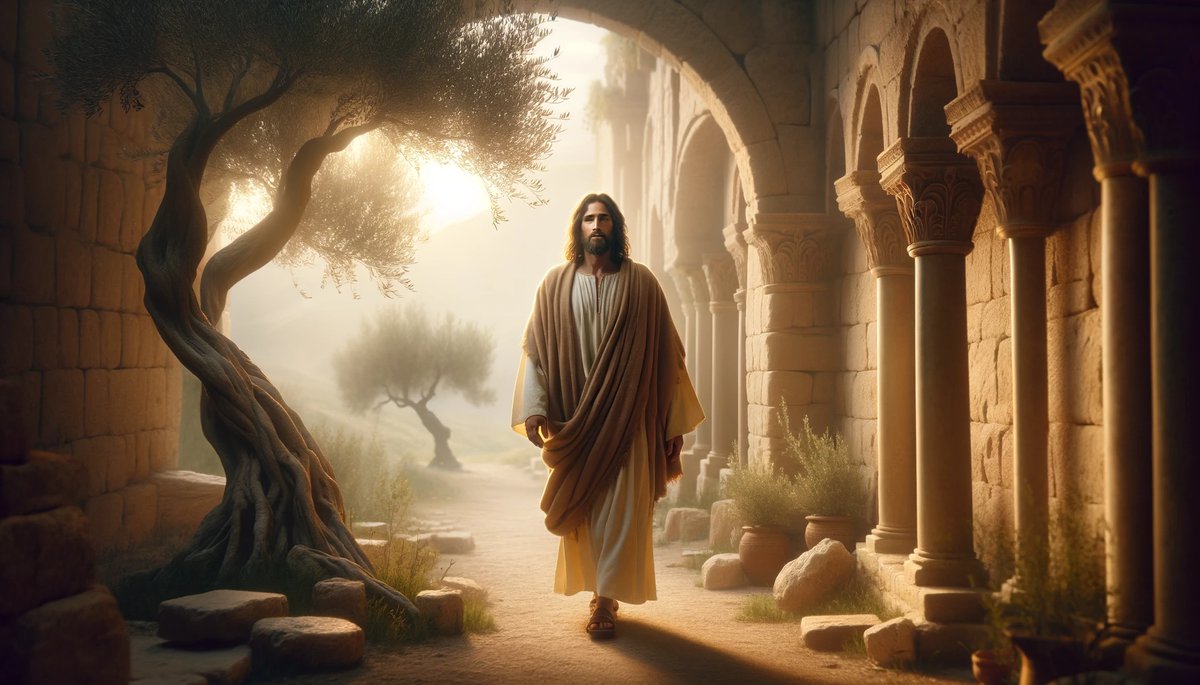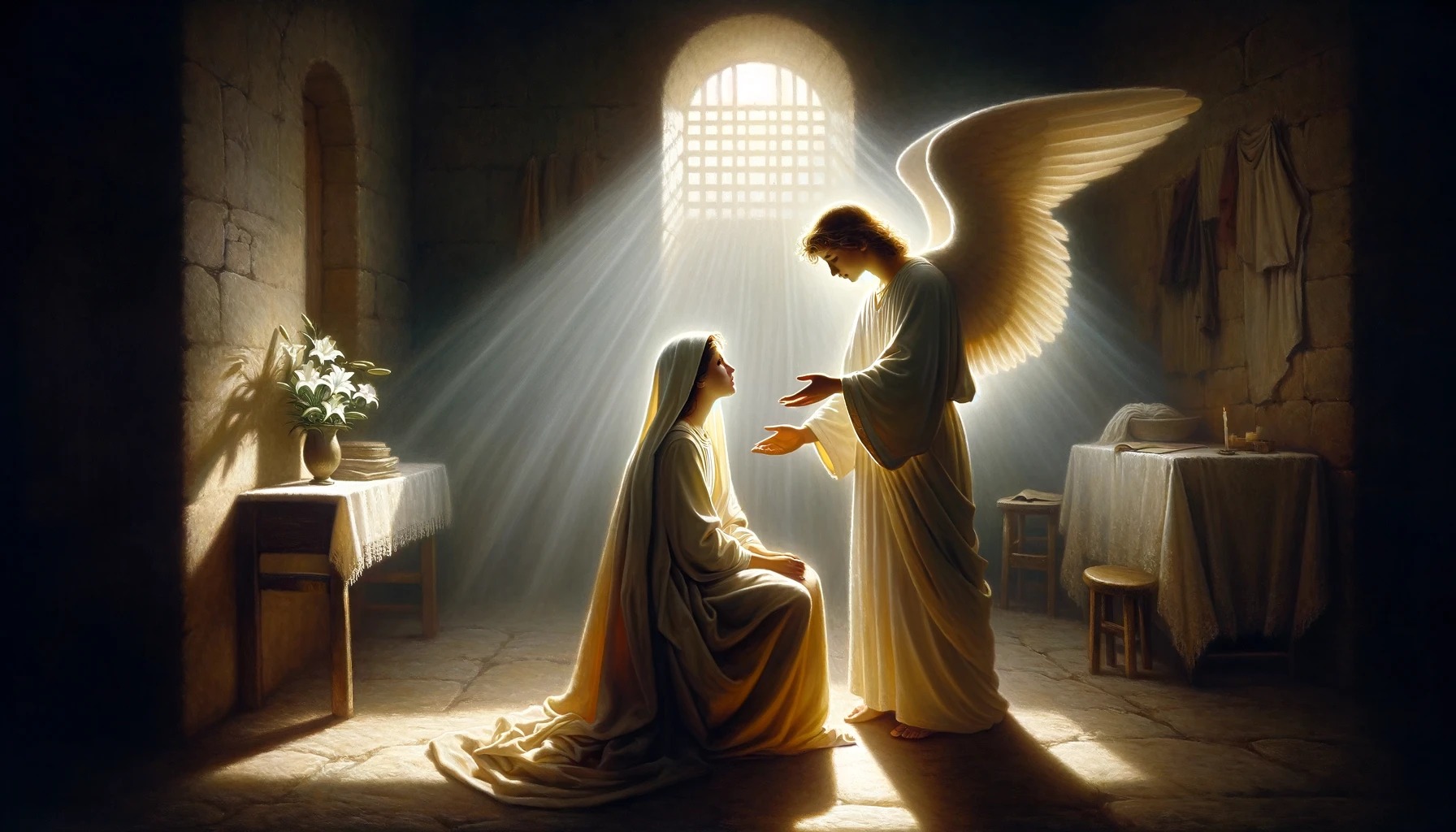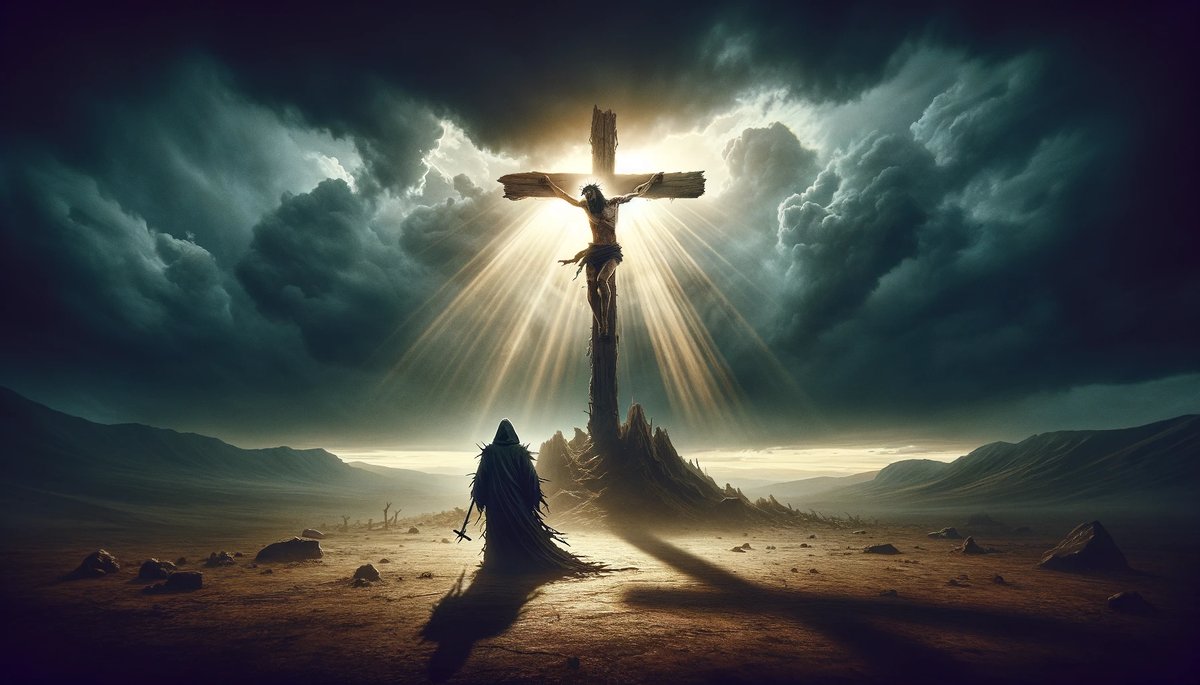Home>Christian Videos>Bible Stories>How To Interpret Jesus Christ’s Cross


Bible Stories
How To Interpret Jesus Christ’s Cross
Published: February 29, 2024
Ericka Andersen, an editor at Christian.net, expertly merges digital strategy with content creation, focusing on faith and societal issues. Her communication skills enhance the platform's engaging narratives, fostering meaningful dialogue on belief's impact on society.
Learn how to interpret the significance of Jesus Christ's cross in the Bible stories. Explore the deeper meaning and symbolism behind this pivotal event.
(Many of the links in this article redirect to a specific reviewed product. Your purchase of these products through affiliate links helps to generate commission for Christian.net, at no extra cost. Learn more)
Table of Contents
The Symbolism of the Cross in Christianity
The cross is a powerful symbol in Christianity, representing the central foundation of the faith. It serves as a reminder of Jesus Christ's sacrifice and the redemption of humanity. The symbolism of the cross encompasses various aspects that are deeply significant to Christians worldwide. Understanding the symbolism of the cross is essential for comprehending the core beliefs of Christianity and the profound impact of Jesus Christ's crucifixion and resurrection. Here are some key points to consider when interpreting the symbolism of the cross in Christianity:
-
Representation of Sacrifice: The cross symbolizes the ultimate sacrifice made by Jesus Christ for the salvation of humanity. It serves as a poignant reminder of the suffering and selflessness demonstrated by Jesus on the cross. This sacrifice is central to the Christian belief in atonement and the forgiveness of sins.
-
Symbol of Hope and Salvation: For Christians, the cross represents hope and the promise of salvation. It is a symbol of God's love and grace, offering believers the assurance of eternal life through faith in Jesus Christ. The cross serves as a beacon of hope, guiding individuals through life's challenges and reaffirming the belief in a greater purpose.
-
Emblem of Faith and Devotion: The cross is a visual representation of faith and devotion for Christians. It serves as a focal point for prayer, reflection, and worship, reminding believers of the teachings of Jesus Christ and the values of compassion, humility, and love. The act of venerating the cross is a demonstration of unwavering faith and commitment to the Christian path.
-
Sign of Victory over Death: In Christian theology, the cross symbolizes the triumph of life over death through the resurrection of Jesus Christ. It signifies the defeat of sin and the promise of eternal life, emphasizing the transformative power of faith and the redemptive nature of Christ's sacrifice.
-
Symbol of Unity and Redemption: The cross serves as a unifying symbol for Christians worldwide, transcending cultural and denominational differences. It symbolizes the universal message of redemption and the unbreakable bond of faith among believers. Through the cross, Christians find a common ground in their shared belief in the redemptive work of Jesus Christ.
Understanding the symbolism of the cross in Christianity provides profound insights into the core tenets of the faith and the enduring significance of Jesus Christ's crucifixion and resurrection. It serves as a timeless emblem of hope, salvation, and unwavering faith for millions of believers around the world.
Read more: What Is The Meaning Of Cross Of Jesus Christ
Understanding the Sacrifice of Jesus Christ
The sacrifice of Jesus Christ holds profound significance in Christian theology, serving as the cornerstone of the faith. The crucifixion of Jesus on the cross represents the ultimate act of love and atonement for humanity's sins. Understanding the sacrifice of Jesus Christ involves delving into the selfless nature of his actions and the redemptive purpose it serves. The crucifixion is a demonstration of unparalleled sacrifice, as Jesus willingly endured immense suffering and death to offer salvation to all. This act of sacrifice embodies the depth of God's love for humanity, as expressed in the biblical verse, "For God so loved the world that he gave his one and only Son, that whoever believes in him shall not perish but have eternal life" (John 3:16, NIV).
The sacrifice of Jesus Christ extends beyond the physical pain and suffering endured on the cross. It encompasses the spiritual significance of atonement and reconciliation between humanity and God. According to Christian belief, Jesus bore the burden of sin on behalf of all people, offering a path to forgiveness and redemption. This act of sacrifice is a testament to the divine mercy and grace extended to humanity, providing a means for individuals to be reconciled with God and experience spiritual renewal.
The sacrifice of Jesus Christ also exemplifies the embodiment of divine love and compassion. His willingness to endure the agony of crucifixion, without resistance or retaliation, reflects the depth of his love for humanity. This sacrificial love serves as a model for Christians, inspiring them to emulate Christ's selflessness and demonstrate compassion and forgiveness towards others. The sacrifice of Jesus Christ on the cross stands as a timeless testament to the transformative power of love and the capacity for redemption through selfless sacrifice.
In essence, understanding the sacrifice of Jesus Christ involves recognizing the profound implications of his crucifixion as a selfless act of atonement, reconciliation, and divine love. It forms the bedrock of Christian faith, offering believers a profound sense of gratitude, humility, and reverence for the redemptive sacrifice of Jesus Christ on the cross.
The Cross as a Sign of Redemption
The cross holds profound significance as a sign of redemption in Christian theology. It symbolizes the transformative power of Jesus Christ's sacrifice and the redemption of humanity from sin and spiritual bondage. The concept of redemption, rooted in the symbolism of the cross, encompasses the themes of forgiveness, restoration, and spiritual liberation for believers.
-
Forgiveness of Sins: The cross stands as a powerful symbol of the forgiveness of sins through the redemptive work of Jesus Christ. According to Christian belief, the crucifixion of Jesus served as the ultimate atonement for the sins of humanity, offering a path to reconciliation with God. The cross signifies the divine mercy and grace extended to individuals, providing a means for the forgiveness of sins and the restoration of spiritual wholeness.
-
Restoration and Renewal: Through the symbolism of the cross, Christians find a source of hope and renewal. The redemptive significance of the cross lies in its ability to restore brokenness and bring about spiritual renewal. It represents a transformative journey from spiritual bondage to freedom, as believers embrace the redemptive love and grace offered through the sacrifice of Jesus Christ.
-
Deliverance from Bondage: The cross serves as a sign of deliverance from the bondage of sin and the consequences of spiritual separation from God. It symbolizes liberation from the power of sin and the restoration of a harmonious relationship with the divine. The redemptive nature of the cross offers believers a sense of liberation and freedom from the burdens of guilt and spiritual alienation.
-
Eternal Salvation: The cross as a sign of redemption signifies the promise of eternal salvation for those who embrace the redemptive message of Jesus Christ. It represents the assurance of eternal life and the hope of a future redeemed from the effects of sin and death. The cross serves as a beacon of hope, guiding believers towards the promise of everlasting life through faith in the redemptive work of Jesus Christ.
-
Symbol of Divine Love: At the core of the cross as a sign of redemption is the profound demonstration of divine love. It embodies the selfless love of God, as manifested through the sacrificial death of Jesus Christ. The cross symbolizes the depth of God's love for humanity, offering a pathway to redemption and spiritual reconciliation.
In essence, the cross as a sign of redemption encapsulates the transformative journey of forgiveness, restoration, and spiritual liberation offered through the redemptive work of Jesus Christ. It serves as a timeless symbol of hope, grace, and the promise of eternal redemption for all who embrace its profound significance.
Interpreting the Crucifixion and Resurrection
The interpretation of the crucifixion and resurrection of Jesus Christ holds immense significance in Christian theology, shaping the core beliefs and spiritual understanding of believers. The crucifixion, symbolized by the cross, represents the sacrificial death of Jesus, while the resurrection signifies his triumph over death and the promise of eternal life. Interpreting these pivotal events involves delving into their profound spiritual, theological, and redemptive implications.
-
Sacrificial Atonement: The crucifixion of Jesus Christ is interpreted as a sacrificial atonement for the sins of humanity. According to Christian belief, Jesus willingly offered himself as a perfect sacrifice, bearing the weight of human transgressions on the cross. This act of atonement serves as the means of reconciliation between God and humanity, demonstrating the depth of divine love and the redemptive power of Christ's sacrifice.
-
Redemption and Salvation: The crucifixion and resurrection are interpreted as the central components of God's plan for the redemption and salvation of humanity. The sacrificial death of Jesus on the cross is seen as the ultimate expression of God's love, providing a pathway for individuals to be forgiven and reconciled with God. The resurrection, in turn, signifies the victory of life over death, offering believers the hope of eternal salvation through faith in Jesus Christ.
-
Defeat of Sin and Death: The crucifixion and resurrection are interpreted as the definitive defeat of sin and death. Through his sacrificial death, Jesus conquered the power of sin, offering believers the opportunity for spiritual renewal and liberation from the consequences of sin. The resurrection further underscores the transformative impact of Christ's victory over death, affirming the promise of new life and the assurance of eternal salvation for those who believe.
-
Symbol of Divine Love and Grace: The interpretation of the crucifixion and resurrection emphasizes the profound demonstration of divine love and grace. The willingness of Jesus to endure the cross, followed by his triumphant resurrection, embodies the depth of God's love for humanity. This act of sacrificial love serves as a testament to the boundless grace extended to all, offering the promise of forgiveness, redemption, and spiritual renewal through faith in Jesus Christ.
-
Eternal Hope and Promise: The crucifixion and resurrection are interpreted as the foundation of eternal hope and promise for believers. The events of Good Friday and Easter Sunday hold the assurance of new beginnings, spiritual transformation, and the hope of a future redeemed from the effects of sin and death. The resurrection serves as a testament to the enduring promise of eternal life for those who embrace the redemptive message of Jesus Christ.
In essence, interpreting the crucifixion and resurrection of Jesus Christ involves recognizing their profound theological and redemptive significance. These events form the cornerstone of Christian faith, offering believers a profound sense of hope, redemption, and the assurance of eternal life through the transformative power of Christ's sacrifice and resurrection.
The Cross as a Symbol of Love and Forgiveness
The cross, as a symbol of love and forgiveness, holds profound significance in Christian theology, encapsulating the essence of God's unconditional love and the transformative power of forgiveness. It serves as a timeless emblem of divine compassion and the redemptive nature of Jesus Christ's sacrifice on the cross.
-
Manifestation of Unconditional Love: The cross stands as a powerful manifestation of God's unconditional love for humanity. Through the sacrificial death of Jesus Christ, the cross symbolizes the depth of divine love, transcending human understanding. It serves as a poignant reminder of the selfless nature of God's love, as expressed in the biblical verse, "But God demonstrates his own love for us in this: While we were still sinners, Christ died for us" (Romans 5:8, NIV). The cross embodies the ultimate act of love, offering a profound demonstration of God's unwavering compassion and grace.
-
Pathway to Forgiveness: The cross represents the transformative power of forgiveness, serving as a pathway to reconciliation and spiritual renewal. According to Christian belief, the sacrifice of Jesus Christ on the cross provided the means for the forgiveness of sins and the restoration of a harmonious relationship with God. It signifies the divine mercy and grace extended to humanity, offering individuals the opportunity to experience forgiveness and the freedom from the burden of guilt and sin. The cross, as a symbol of forgiveness, embodies the capacity for spiritual healing and the restoration of wholeness through the redemptive work of Jesus Christ.
-
Model of Compassionate Forgiveness: The cross serves as a model of compassionate forgiveness for believers. Jesus Christ's willingness to endure the suffering of the cross, accompanied by his words of forgiveness for those who crucified him, exemplifies the transformative nature of forgiveness. It inspires Christians to emulate Christ's example of forgiveness and compassion, encouraging them to extend grace and forgiveness to others. The cross, as a symbol of love and forgiveness, calls believers to embody the spirit of forgiveness in their interactions with others, reflecting the redemptive love demonstrated through the crucifixion.
-
Reconciliation and Redemption: The cross symbolizes the profound reconciliation and redemption made possible through the love and forgiveness of Jesus Christ. It represents the restoration of a broken relationship between humanity and God, offering believers the assurance of spiritual renewal and the promise of eternal life. The redemptive significance of the cross lies in its capacity to bring about reconciliation, healing, and the transformative power of God's love and forgiveness.
-
Eternal Symbol of Grace: The cross stands as an eternal symbol of God's grace and the boundless nature of divine forgiveness. It embodies the enduring message of God's love and forgiveness, offering believers the hope of spiritual renewal and the assurance of eternal salvation. The cross, as a symbol of love and forgiveness, serves as a testament to the redemptive grace extended to all, inviting individuals to embrace the transformative power of God's love and forgiveness.
In essence, the cross as a symbol of love and forgiveness encapsulates the profound demonstration of God's unconditional love, the transformative power of forgiveness, and the promise of redemption through the sacrificial death of Jesus Christ. It serves as a timeless emblem of divine compassion, offering believers the assurance of forgiveness, reconciliation, and the boundless love of God.

